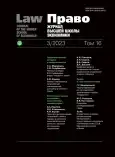Specifics of Regulatory and Legal Regulation of Generative Artificial Intelligence in the UK, USA, EU and China
- Authors: Li Y.1
-
Affiliations:
- Institute of Comparative Law, China University of Political Science and Law
- Issue: Vol 16, No 3 (2023)
- Pages: 245-267
- Section: Law in the Modern World
- URL: https://journal-vniispk.ru/2072-8166/article/view/318263
- DOI: https://doi.org/10.17323/2072-8166.2023.3.245.267
- ID: 318263
Cite item
Full Text
Abstract
On November 30, 2022, OpenAI launched ChatGPT conversational artificial intelligence; with the latest version update, ChatGPT has demonstrated an impressive ability to understand natural language, making it an attractive tool for companies and individuals looking to provide customer service and support. GPT-3 uses textual data, mostly from publicly available information on the Internet, as training data. GPT-4, on the other hand, uses a large number of images in addition to textual data for training, and thus can process both textual and graphical data. The emergence of generative AI has greatly impacted human life, but it can be said that intelligent technology is a double-edged sword: rapid development of generative artificial intelligence (AI) technologies, on the one hand, it can improve efficiency and productivity, reduce costs and open new opportunities for economic growth, but on the other hand, the use of generative AI services to create synthetic content in the form of text, audio, video and images poses possible risks. To date, different regions around the world are at different stages of development of normative acts concerning generative AI. Using the comparative legal method and the method of system analysis, this article analyzes in detail the main models of legal regulation of generative AI in the modern world on the example of the UK, the USA, the European Union and China, noting the different approach in the development and adoption of relevant normative legal acts in the field of regulation of generative AI services. It especially reveals the Chinese government’s position on “development and security” and “innovation and governance” at present. The main trends of improving the regulation of generative AI services by China are proposed, and it is concluded that it is necessary to balance “rule of law” and “innovation” and promote the healthy development of generative AI.
About the authors
Yao Li
Institute of Comparative Law, China University of Political Science and Law
Email: noreply@hse.ru
ORCID iD: 0000-0002-9933-7513
Postgraduate Student
References
- Cai S., Yang L. (2023) Study in the risk and collaborative governance of ChatGPT intelligent robot application. Qing bao li lun yu shi jian=Intelligence Theory and Practice, no 5, pp.14-22 (in Chinese)
- Cao J. (2023) Toward trustworthy AI: governance challenges and responses to ChatGPT-like generative artificial intelligence. Shang hai zheng fa xue yuan xue bao=Bulletin of Shanghai Institute of Politics and Law, no. 4, pp. 28-42 (in Chinese)
- Cao S., Cao R. (2023) Impact of generative AI on exploration science research and practice using ChatGPT as an example. Xian dai qing bao=Contemporary Exploration Science, no. 4, pp. 3-10 (in Chinese)
- Chen B. (2023) Rule of law basis for the credible development of generative artificial intelligence. Shang hai zheng fa xue yuan xue bao=Bulletin of Shanghai Institute of Politics and Law, no. 4, pp.13-27 (in Chinese)
- Deng J., Zhu Y. (2023) Legal risks of ChatGPT model and strategies to overcome them. Xin jiang shi fan da xue xue bao (zhe xue she ke ban)=Bulletin of Xinjiang Pedagogical University (Philosophy and Social Science Series), no. 5, pp. 91-101(in Chinese)
- Gu N. (2023)Emergent ability, risk regulation and industrial coordination of generative artificial intelligence. Jin chu fa xue=Jingchu Law Review, no. 3, pp. 7083 (in Chinese)
- Jin S. (2022) The DEPA path of global data governance and China's choice. Cai jing fa xue=Finance and Economics Law, no. 6, pp. 96-110 (in Chinese)
- Liu Y. (2023) The three major security risks of generative artificial intelligence and legal regulation — Taking ChatGPT as an Example. Dong fang fa xue=Eastern Law, no. 4, pp. 30-43 (in Chinese)
- Que T., Lu C. (2021) Technological innovation and the paradigm shift of public administration in the intelligence era. Zhong guo xing zheng guan li=Chinese Administrative Management, no. 2, pp. 21-30 (in Chinese)
- Shang J. (2023) Study in rules for generative AI risk governance. Dong fang fa xue=Eastern Law, no. 3, pp. 4-17 (in Chinese)
- Sun Y., Zhou X. (2011) Study in progress of content filtering technology. Xin xi an quan yu tong xin bao mi=Information Security and Communication Secrecy, no. 9, pp. 45-49 (in Chinese)
- Wang Y., Yan H. (2023) Risk iteration and regulatory innovation of generative artificial intelligence — a case study of ChatGPT. Li lun yue kan=Monthly Theoretical Journal, no. 6, pp.14-24 (in Chinese)
- Wei J., Tay Y. et al. (2022) Emergent abilities of large language models. Transactions on Machine Learning Research, no. 8, pp. 1-2.
- Yu X., Zheng G., Ding X. (2023) Generative Artificial Intelligence and the Law: Taking ChatGPT as an Example. Zhong guo fa lv ping lun=China Law Review, no. 2, pp.1-20 (in Chinese)
- Yuan Z. (2023) Study in the responsibility ability of generative artificial intelligence. Dong fang fa xue=Eastern Law, no. 3, pp.18-33 (in Chinese)
- Zhi Z. (2023) Generative artificial intelligence large models for information content governance. Zheng fa lun tan= Politics and Law Forum, no. 4, pp. 34-48 (in Chinese)
Supplementary files








